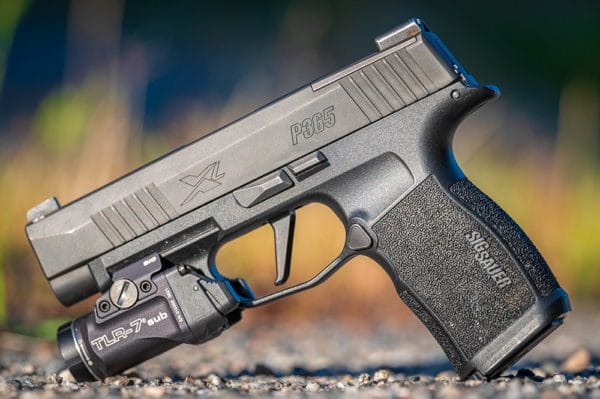
U.S.A. -(AmmoLand.com)- That didn’t take long. The U.S. Supreme Court’s landmark ruling in New York State Rifle & Pistol Association v. Bruen, striking down the New York’s restrictive and subjective “may issue” pistol permit license requirement, is already reverberating in states that had similar restrictions.
There were eight states with “may issue” laws prior to the Supreme Court decision. It’s no surprise the states being forced to adjust their conceal carry permit schemes are antigun states with antigun governors and legislatures that have already imposed the nation’s most stringent gun control. Meanwhile, criminals continue ignoring laws new and old.
New York
New York’s gun control leaders were not happy with the SCOTUS decision. “I’m absolutely shocked,” New York Gov. Kathy Hochul said while announcing an “extraordinary” special legislative session to force even more gun control policies after Bruen. In an overnight antigun deal, New York passed stricter gun control laws that went beyond the concealed carry permit requirements.
While Bruen told New York it couldn’t be subjective in issuing which law-abiding citizens could obtain their carry permits, the legislature doubled down with new laws requiring the submission of personal social media accounts that are still using subjective criteria to approve permits. The new law doesn’t just violate the Second and the Fourteenth Amendments but also First Amendment freedoms too. The legislature also added more locations where New Yorkers can’t carry – including places the Supreme Court Justices discussed in their Bruen oral arguments, such as the subway. None of the new policies, Gov. Hochul said, were “meant to focus on lawful gun owners.”
The gun control package has a laundry list of locations, including government buildings, health care facilities, places of worship, libraries, public playgrounds and parks, daycares, summer camps, addiction and mental health centers, shelters, public transit, bars, theaters, stadiums, museums, polling places and casinos. Even Times Square in New York City is a “gun free” zone. All private property is a “sensitive place” unless the property owner posts a sign to allow a law-abiding citizen exercising their right to carry a firearm in public for self-defense to enter.
New York’s new laws will require applicants to undergo 16 hours of in-person training plus hours at a firing range, sit down for an in-person interview, provide their social media accounts for content review, provide contact information for household members, renew their license after three years including resubmitting their fingerprints, and face monthly background checks. Other provisions require background checks for all purchases of ammunition for guns that require a permit and new mandatory rules for firearm storage in homes – something Heller ruled a violation of the Second Amendment – and vehicles.
New York is just simply thumbing its nose at the Supreme Court.
California
In California, Attorney General Rob Bonta released a directive telling state law enforcement to “cease all ‘good cause’ requirements” for concealed carry applicants. “It is the Attorney General’s view that the court’s decision renders California’s good cause standard to secure a permit to carry a concealed weapon in most public places unconstitutional,” wrote AG Bonta. “Permitting agencies may no longer require a demonstration of good cause.” AG Bonta hedged just a bit, though, adding, “It remains reasonable — and constitutional — to ask applicants why they are interested in carrying their firearms in public,” and that applicants should still provide proof of “good moral character.”
AG Bonta’s office released a trove of California gun owner information with publicly accessible files that included identifying information days after the Supreme Court handed down the Bruen decision. According to The Reload, “The leaked information includes the person’s full name, race, home address, date of birth, and date their permit was issued. The data also shows the type of permit issued, indicating if the permit holder is a member of law enforcement or a judge.”
AG Bonta’s office released a milquetoast statement after the data release, saying, “We are investigating an exposure of individuals’ personal information connected to the DOJ Firearms Dashboard. Any unauthorized release of personal information is unacceptable.”
The California Rifle & Pistol Association is determining the extent of the damage caused by AG Bonta’s gun owner data release. “Litigation is likely,” CRPA President Chuck Michel told The Reload.
Maryland and Massachusetts
Maryland Republican Gov. Larry Hogan also dropped the “good and substantial” reason requirements. Maryland allowed the state’s pistol permit issuing authority to “use discretion” when issuing permits. Not anymore.
“In light of the [Bruen] ruling and to ensure compliance with the Constitution, I am directing the Maryland State Police to immediately suspend utilization of the ‘good and substantial reason’ standard when reviewing applications for Wear and Carry Permits,” Gov. Hogan announced. “It would be unconstitutional to continue enforcing this provision in state law.” Maryland requires permit applicants to be 21 years old.
Massachusetts Attorney General Maura Healy followed suit and released new guidance on July 4, telling issuing authorities they “should no longer deny or impose restrictions on licenses to carry a gun just because the applicant doesn’t have a ‘good reason’ to carry.”
Monitoring Remaining States
The remaining states with similar “may issue” permitting laws are watching and considering the next steps too. In Hawaii, it’s extremely difficult to obtain a handgun license and applicants must prove that they have an “exceptional case” and a “reason to fear injury.” Honolulu police say there are no immediate changes to the state’s process, but gun rights groups are hinting at litigation. Connecticut, Rhode Island and Delaware are in similar “wait and see” situations.
It is clear the Bruen decision is already having an impact on law-abiding Americans and their ability to obtain a concealed carry permit. What remains to be seen is what other obstacles will be thrown at them to do so and whether those restrictions will be challenged in the courts.
About The National Shooting Sports Foundation
NSSF is the trade association for the firearm industry. Its mission is to promote, protect and preserve hunting and shooting sports. Formed in 1961, NSSF has a membership of thousands of manufacturers, distributors, firearm retailers, shooting ranges, sportsmen’s organizations, and publishers nationwide. For more information, visit nssf.org

from https://ift.tt/Ls7qPVx
via IFTTT

No comments:
Post a Comment